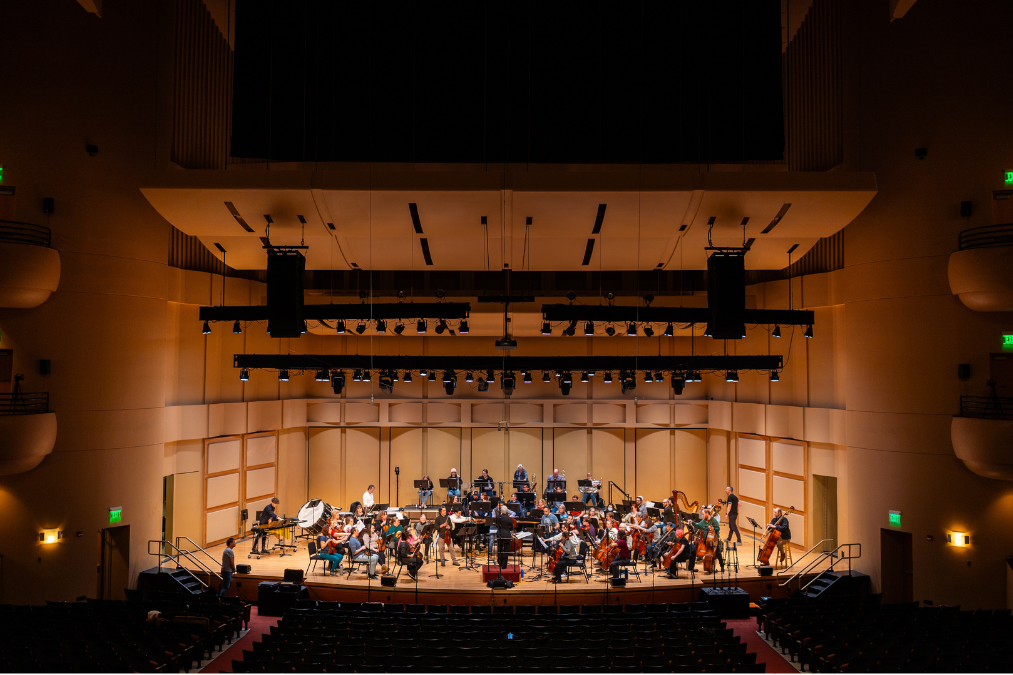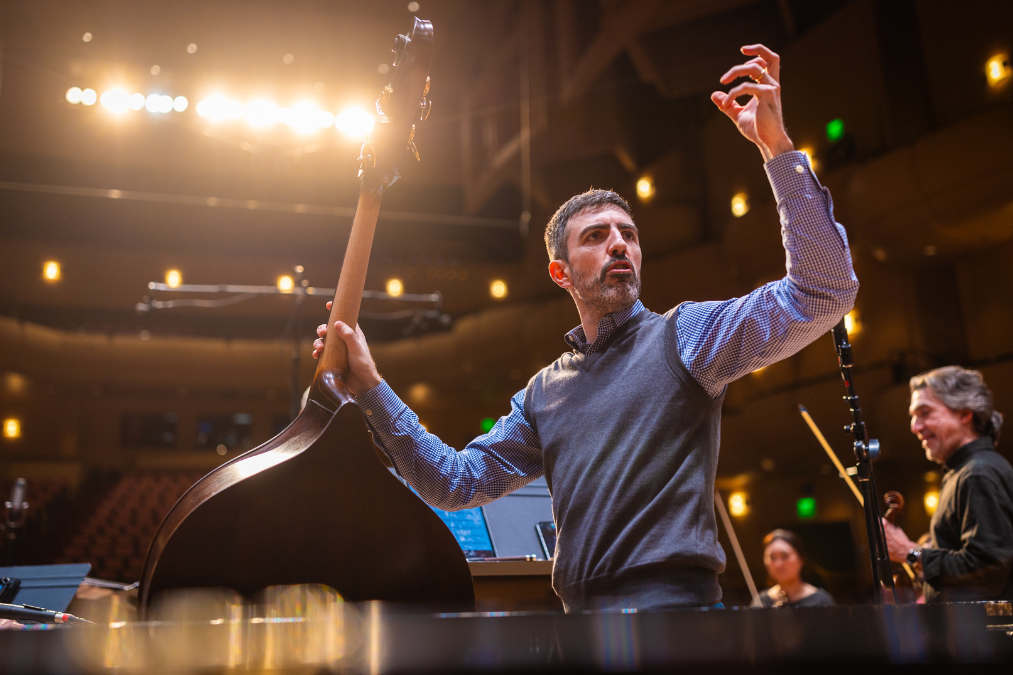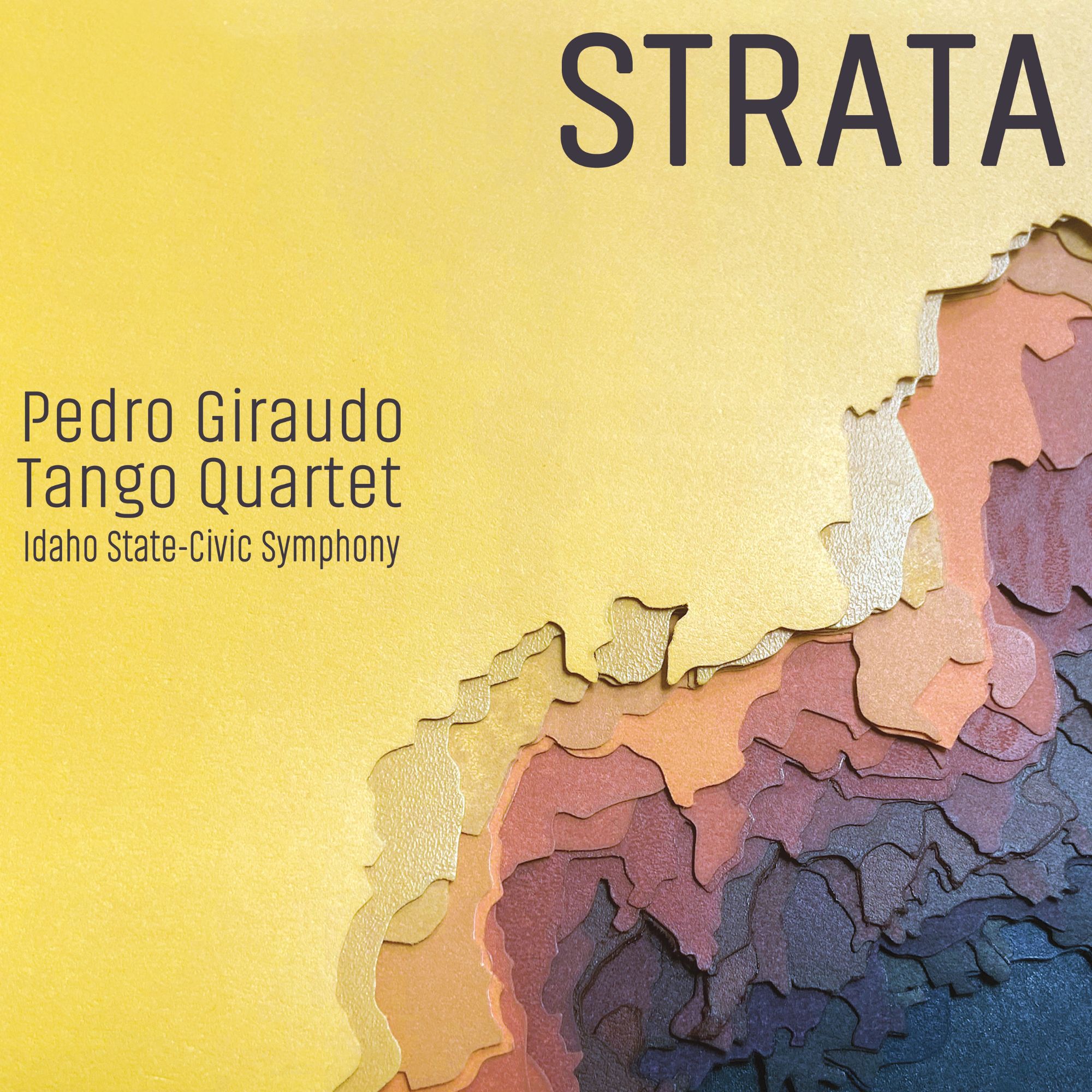Here is Strata! An extraordinary accomplishment for the community

Elisabeth Curtis
November 8, 2024
The album Strata is a groundbreaking collaboration between the Idaho State-Civic Symphony, the Pedro Giraudo Tango Quartet, the ISU Commercial Music Program, and City Creek Records at Idaho State University
This extraordinary project—an ambitious journey from the concert hall to a CD, LP, or streaming from your device—marks a significant achievement for the ISU and Pocatello community. The album showcases the fusion of jazz, tango, and classical orchestration, reflecting years of planning and dedication from everyone involved.
ISCS conductor Nell Flanders and composer and musician Pedro Giraudo originally met in New York through a shared passion for tango, and this album stems from their desire to work together and integrate unique musical perspectives. Working with Jonathan Armstrong, the head of ISU’s Commercial Music Program and visionary behind City Creek Records, the project grew into a deeply collaborative and transformative experience for students and professionals alike.
Flanders and Armstrong share the story behind this remarkable project as they look forward to the celebratory album concert on November 9.
Nell Flanders, DMA
Assistant Professor and Director of Orchestral Activities at ISU
Conductor/Artistic Director of the Idaho State-Civic Symphony
This project started several years ago. In NY I met Pedro Giraudo. We met through tango. I always wanted to collaborate with him. Pedro is from Argentina and came to the US over 20 years ago to study bass in New York. He started his band that’s been active for over 10 years.
I feel incredibly lucky. When I came to Pocatello in 2022 I realized very quickly that this is such a unique situation that we have at ISU. For an orchestra to record an album is incredibly expensive.
No one makes any money. In this landscape, the reality is that recording music is much easier than it’s ever been before, but to make money is very hard. Recording an orchestra is incredibly complicated.
The fact that ISU has this amazing commercial music department with a visionary like Jon, a record label, and the group of experienced, excellent faculty members and community members, and students who are so eager to get involved and whose purpose to be at ISU is to learn the science and craft of sound. For them to be able to record an orchestra with four solo instruments is an incredible opportunity.
There were so many phases to this project. Two years ago Pedro, Jon, and I got on a zoom call to discuss this. I had previously performed with Pedro in Baltimore. He and I knew we enjoyed working together. The collaborative nature of this project is integral to who Pedro is. We want to be inspired by each other. It’s three people with different perspectives but together it will be better.
I have to credit our gorgeous hall which is a lovely place to record.

ISU and the community merged 50 years ago into the ISCS. The orchestra is a beautiful combination of ISU faculty, students, and community members funded primarily by the ISCS foundation. We do outreach programs for kids and we have two youth orchestras. A big part of the mission is to support music education in this region.
The City Creek Record Label produces amazing records from the students in the program and other professional artists.
It’s a big deal for ISU to have a record label and for this to be spread to the world.

After deciding to do the project, the next step was figuring out what we were going to do for the music. Pedro is really good at tailoring his arrangement to the players at hand. He tailored the arrangements and composed the music for us. Some of the new pieces are premiered on this album. This is also his first album.
Pedro’s father was an orchestra conductor and he grew up with the sound of orchestra in his ear. To add the element of the orchestra to his jazz has brought out so much from his musical voice.

We printed LP’s as well as CD’s. The decision to print physical media was not obvious initially. I had not anticipated how complicated production would be. The artwork for the album is so beautiful. Shawn Edrington created an original work of art. He used layers of paper that he colored and cut out so they lie on top of each other. That inspired the title of Strata.
It felt apt because this music is a layering of different musical styles, the musicians, and the collaboration. I feel like we got it right and I could not be more proud.

Part of the student experience is having the opportunity to perform with professional musicians. One of my motives with this project was to push the orchestra to grow, to push the bounds of what we think we can do in terms of our skill and stylistic ability. There is nothing like you performing to make you stand up to do your best and give it your all. The music is complicated. It’s a complex musical language. Latin rhythms are not as present in classical music.
The Tuesday when the quartet showed up was earth-shattering. To have these musicians who have played in this style for years and inspire the musicians. We transformed overnight.

With this difficult music the way I structured the sessions is we would rehearse then do a 1st, 2nd, 3rd, 4th take. The amount of concentration that goes into one 4-minute take is really intense.
The process of repeating the music it’s like wine mellowing. The flavors blended in a whole new way. Almost across the board the final take we used for the album was the last take. It just got better and better.
Creating the arrangements with Pedro was fascinating. He’s a skilled orchestrator. I didn’t really appreciate this until I started helping him edit the parts. We spent months poring over orchestra parts and talking about what would work. I was talking with members of the orchestra and getting feedback.
Jonathan Armstrong, MFA
Associate Professor of Music | Jazz and Commercial Music
Coming to ISU, it was immediately apparent to me what a gem this job was. I’ve come to understand ISU as a “Goldilocks” institution. You can do ambitious projects. The leadership, the dean of the college and the music department, were so open minded and allowed me to try out these ideas I had.
My background is in jazz. In Los Angeles I was going to grad school and worked as a professional musician.
Jazz was the primary engine of popular music. I was in LA and I saw the cracks in the foundation of what was happening in the industry.
I used to buy one album and cherish it and that culture started to shift in the early 2000’s. TV studios had orchestras. All the shows would hire musicians. There are only a few shows left that have live musicians: The Simpsons and every Seth Macfarland show. Most movies are going in this direction as well.
I saw the seismic shift happening within the recording industry. Coming to Idaho I wasn’t interested in maintaining old ways.
The core is more dynamic artists now. The gigs became people who were multi-instrumentalists, could compose, could perform live, could record. Coming here and building the commercial music program, this was on the forefront of my mind. I wanted to build a program where students could learn all these skills, learn who they are as artists, and build their professional portfolio while they’re in school. They’re building professional credentials, sometimes as a recording engineer, musician, and promotions. It proves these students with a growing professional portfolio.
Within a couple of years I had artists reaching out to me who wanted to work with us.
I work with these artists and our students helped record their album and they got professional credit on that. When Nell and I talked in 2022 with Pedro it felt like an obvious next step for us. It all clicked to me that we could bring in our talent on the commercial music side to develop a production flow to produce this album.
I loved the element that we had students, faculty, and community from the commercial music side as well as the symphony side.
I wanted the program to be integral to the rest of the music department so I was thrilled to have a respected colleague who wanted to work on something.
I can think of no better experience for a student than that. Learning things in the abstract is important towards a goal. How do you learn to do something? You go and do it. I love this idea that the commercial music program is essentially a record label. Every assignment in the classes is to produce something on the record label as opposed to learning in the abstract.
There were so many elements of things we had to figure out through this experience that they could never have learned in the class. When you’re on the gig it’s the most incredible way to learn.
Musicians are very important members of the tribe and Spotify can’t ruin that. The current music infrastructure is roughly 100 years old. It’s a blip in time compared to the history of music. If you think you want to be a musician, you’ll know by experiencing it in my program. It’s an ethical way to show them what the music industry is.
For City Creek Records it was such an honor to do this. It was a giant leap for everything we’ve done with the record label. I’ve seen the results that carried over to this year with the work the students are producing.
To be entrusted with something this big, students rise to the occasion. If you trust them and ask a lot of them they rise to the occasion. We have many wonderful students who rose to the occasion. We saw those students who understood what this was. They were there for hours making sure everything was right.
